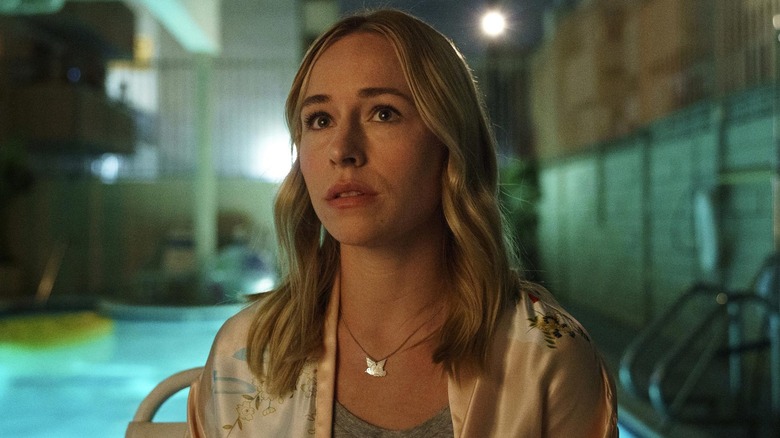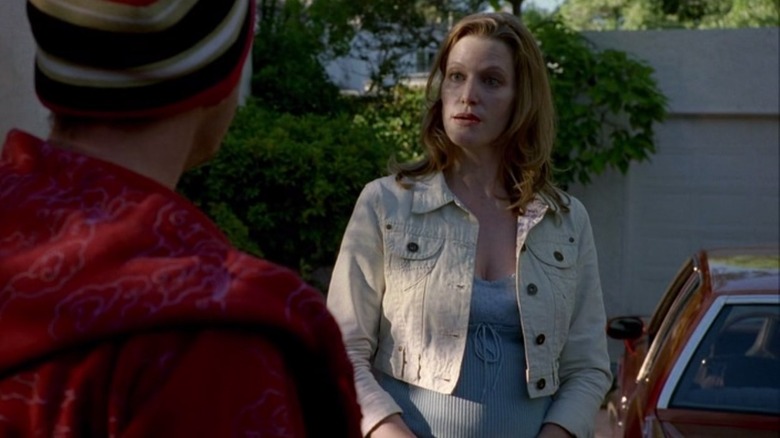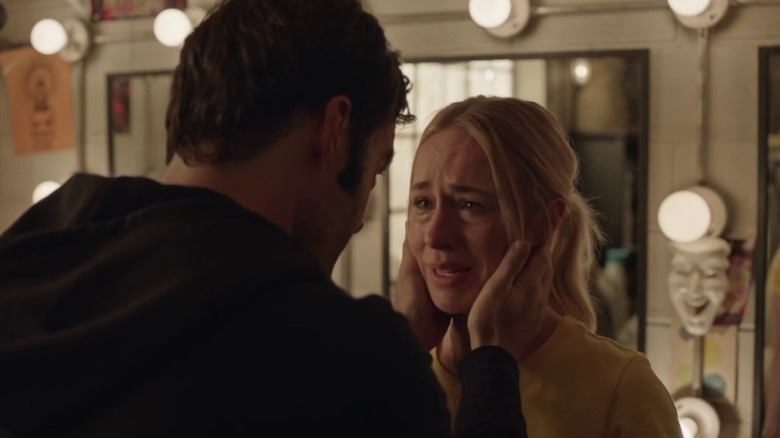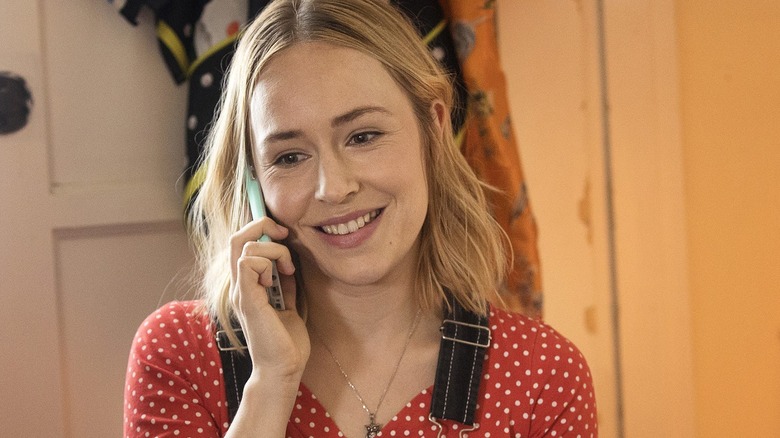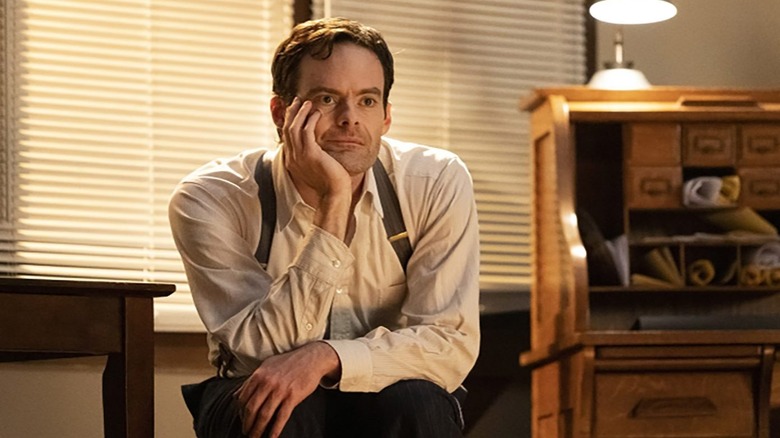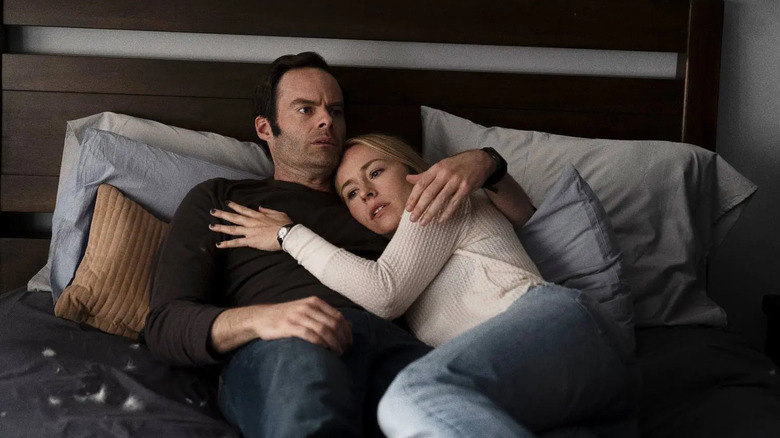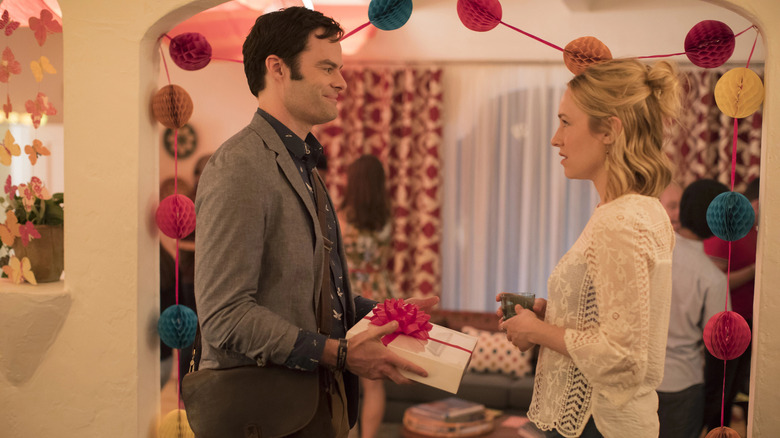On Season 3 Of Barry, Sally Reed Holds It All Together
Although HBO's "Barry" is slightly more of a comedy than other prestige dramas like "Breaking Bad," it does feature a similar dynamic: the main hero with the big, dark secret, and the love interest character he's hiding the secret from. It's not the exact same, though: Sally (Sarah Goldberg) doesn't know Barry (Bill Hader) before the start of the show, and she's a lot less suspicious of him throughout the first two seasons. Skyler (Anna Gunn) picked up on her husband's changes right away in "Breaking Bad," but season 2 of "Barry" comes and goes without Sally coming any closer to figuring things out.
The thing that really unites the two characters is how they're both the most hated character in their show's fandoms. Just as Skyler was so widely disliked that the actress wrote a whole op-ed in the New York Times about the death threats she was getting, Sarah Goldberg is frequently asked in interviews about "how it feels to play a character who is 'so unlikable.'"
Luckily it doesn't seem like anyone's directing their hate for the character at the actual actress yet, so we know society has progressed at least a little bit since 2013. Even still, the different standards for the way characters like Sally are received compared to the men on the show is amusing to Goldberg. She commented to Vanity Fair, "This bottomless appetite we have for male violence and this absolute allergy we have to female ambition — it constantly astounds me."
The pointlessness of moral defenses
One of the common defenses of both Skyler and Sally is an insistence on looking at the situation through the limited lens of objective morality. Defenders of Skyler will point out that technically speaking, she's in the right from pretty much the first episode. She's pregnant with another child and her husband is off cooking meth; it makes sense for her to want to know what's going on, and it makes sense for her to be fighting him nearly every step of the way. Similarly, as much as Sally Reed's tunnel vision regarding her career leads to her being self-centered and hurtful to other people, that's nothing compared to the fact that Barry is a literal murderer from episode 1.
These defenders are right of course, but these arguments often feel a little pointless. When audiences go into a show like this they're prepared to follow a character who doesn't stick to conventional ideas of morality. Walter White might be an increasingly terrible person, but he's also compelling and doing exciting things while Skyler is constantly getting in his way. To the type of person who finds Skyler annoying because of this, no amount of "well, technically she's in the right" is going to change their mind.
That's why no amount of pointing out that Barry's actions are technically worse than Sally's is going to change the way fans feel about her. Most of us don't have to deal with assassins in our day-to-day lives, but we've all met someone who acts like Sally. The premiere of season 3 features Sally telling her friend Natalie (D'arcy Carden) to not talk during her meetings. Sally's tone is polite, but what she's actually saying is dismissive and mean as hell. "Barry" never tries to appease the type of viewer who would seethe over Skyler White; they let Sally be a messy, flawed person, even it means she'll have annoying moments.
Sally and Sam
Despite this aspect of her character, Sally is still placed in situations throughout the show that make her feel almost absurdly sympathetic, to the point where it's genuinely hard to imagine how someone could not root for her at least a little bit. There's a moment in an early season 1 episode where her agent suddenly makes a predatory move on her. Sally is stunned and confused until said agent decides to play it off as a joke. Goldberg explains about the scene, "She ends up apologizing and trying to ease his embarrassment instead of standing up for herself." Sally is subsequently dumped by the agent, who never gets any kind of comeuppance for what he did.
In the finale of season 1, Sally mentions having an abusive ex-husband to Barry, and early in season 2, she's given a whole storyline exploring her past relationship with that man. Despite writing an autobiographical scene for her acting class where she triumphantly tells off and breaks up with her abusive husband Sam (Joe Massingill), when Sam confronts her in real life about it we see her return to the reaction she had to her agent in season 1; she's suddenly polite and as non-confrontational as possible. Season 2's "What?!" is a highlight for Sally's character and a reminder of why we need Sarah Goldberg in more shows and movies: we watch as she's lured into Sam's hotel room and manipulated by him, and as she tries to stay calm and polite despite being clearly terrified, all our previous complaints about Sally feel suddenly so small and insignificant.
Sympathy for imperfect victims
If you were following the fan forums at the time, you may remember the fan theory in season 2's early episodes that Sally was lying about her ex being abusive. The theory wasn't completely out of nowhere — her claim that she triumphantly told him off definitely wasn't true — but it did speak to just how little fans thought of Sally at the time; that they really thought she'd make up something so damning towards an actual person from her life. In reality, Sally's decision to lie about how she left the relationship is for the same reason such a large percentage of the fanbase assumed she was lying about the abusive nature of the relationship itself: she didn't handle it in the way she was "supposed" to handle it.
This is probably one of the smartest decisions the show's made, and why "Barry" tackles domestic abuse much more effectively than some other HBO shows. The show isn't interested in unambiguous girl boss moments where the abused gets to feed her abuser to his own dogs as the audience cheers, focusing instead on a clear message that nobody deserves to be in an abusive relationship, regardless of how flawed they are outside of it. Sally is not the mythical perfect victim by any stretch, but "Barry" shows a clear understanding that if you don't have empathy for flawed victims of abuse, then your empathy for victims of abuse is likely only surface level in the first place. It's similar to the way "Euphoria" presents addiction in its controversial season 2: if you lose your compassion for Rue (Zendaya) when her addiction leads her to do objectively terrible things, the show argues (correctly) that you don't actually have much compassion for addicts in the first place.
The 'new' Sally
Goldberg describes Sally as "somebody who's come to Los Angeles totally desperate, totally lost, really needing to re-invent herself and believe this new mythology of what her life is." Through acting and through moving far away from her home, she's found a new narrative for herself as someone who used to be weak but is now strong and independent. The re-emergence of Sam in her life hits hard because it reminds her that she hasn't changed as much as she thought. But as Barry sort of argues as she breaks down in front of him in a self-hating rant, this attempt to divide her life into "weak Sally" and "strong Sally" isn't healthy. "You left," he says, "That's what's important."
Unfortunately for Sally, this is pretty much the last period of the show where Barry is a good boyfriend. The rest of the season finds Barry going down an increasingly dark path, as Fuches decides to sabotage his relationship with Cousineau and Barry ends up going on a murder rampage in the finale. Just as Sally and Sam's relationship started off fine and normal for the first year or so, her season 2 arc surrounding Sam occurs just as she's reaching the end of her normal period with Barry. This shift isn't fully clear until the latest episode ("Limonada"), where a stressed-out Barry comes in and screams at her in front of her coworkers, getting right in her face and backing her up against the wall.
When Barry yells at her like this, it first seems like this is a new, sudden low point for their relationship brought about by the stressful situation Barry's going through with Cousineau (Henry Winkler). I expected him to have to struggle to get back into Sally's good graces afterward, or at the very least to see Sally start to be suspicious of him for the first time on the show.
'Sorry about earlier'
Instead, Sally calls up Barry at the end of the episode to apologize to him, blaming herself for not being fully attentive. Barry accepts her apology, offering none of his own, and it becomes clear that their relationship has already descended into a deeply unhealthy place. Sally's talking to Barry the same way she talked to the creepy agent in season 1 and Sam in season 2, without seeming to realize it. The implication of that final phone call is that this isn't the first time something like this has happened between the two, and it won't be the last.
It's fascinating to watch because, as absurd as the premise of "Barry" seems on the surface, what we've just seen is one of the most realistic depictions of how an abusive relationship can play out in real life. Barry was the same guy who was comforting Sally and helping her move past her last abusive ex, and he was so disgusted by Sam's behavior that he nearly tried to kill him, and yet here he is taking himself and Sally down the same path. Without telling us what they were going to do, "Barry" addresses all the standard questions victims of abuse get asked, most notably: why'd you even get in a relationship with someone who treats you so poorly? The answer, as just shown to us gradually throughout eighteen episodes, is that they often don't treat you poorly until they do.
Challenging narratives about abuse
At the same time it takes the question of "why didn't you just leave?" and dials it up to eleven: Barry's not just an abusive ex, he's a trained killer. This same episode where he's screaming at Sally is the one where he's driving Cousineau around in the trunk of his car. The moment Cousineau drops the bullets in the premiere, there's no doubt in our minds that Barry is in complete control over what happens next. As "Limonada" ends with Barry threatening Cousineau's family and then creepily asking him to tell him he loves him, it's clear that Sally's in way more danger than she even realizes.
This storyline also challenges preconceptions of what an abuser looks like, again differentiating itself from the cartoon villain abusers of "Game of Thrones." Even though Barry is a literal murderer, one of the early seasons' greatest ironies was the fact that he was a lot cooler and laid back than most of the law-abiding citizens of the show. Barry may have no trouble choking a guy to death, but he also seems to be the nicest and most overall self-aware guy in his acting class. As much as he grapples with being evil, it's unlikely Barry thinks of himself as having anything in common with Sam. If that phone call was any indication, he doesn't seem to even think he did anything wrong there.
The question only Sally can answer
The defining question behind "Barry" is whether or not the titular character can ever truly become a good person. Or, at the very least, if he could ever stop being evil. The season 3 premiere centers this question around Cousineau's reaction to learning the truth about Barry. Barry wants to be forgiven, and when Cousineau tells him it's possible to earn his forgiveness, Barry tries his honest (if misguided) best to do so. But of course, Cousineau isn't the right person to ask when it comes to the question of whether Barry can really be good or not, nor is NoHo Hank (Anthony Carrigan). In fact, when Barry asks if Hank thinks he's evil, Hank misunderstands his concerns and tries to assure him, "You're like the most evil guy I know, man."
Instead, in this second episode of the new season, "Barry" places this question in the hands of Sally. We don't know if Sally will realize what's going on and try to get out of it, if things will spiral further, or if Barry himself will realize what's he doing to her and change his behavior. (Unlikely, given his total lack of guilt during that final phone call between them.) When it comes to figuring out what the show wants us to think about Barry's ability to change or grow, it all comes down now to what Sally chooses to do about him, and how Barry chooses to respond.
